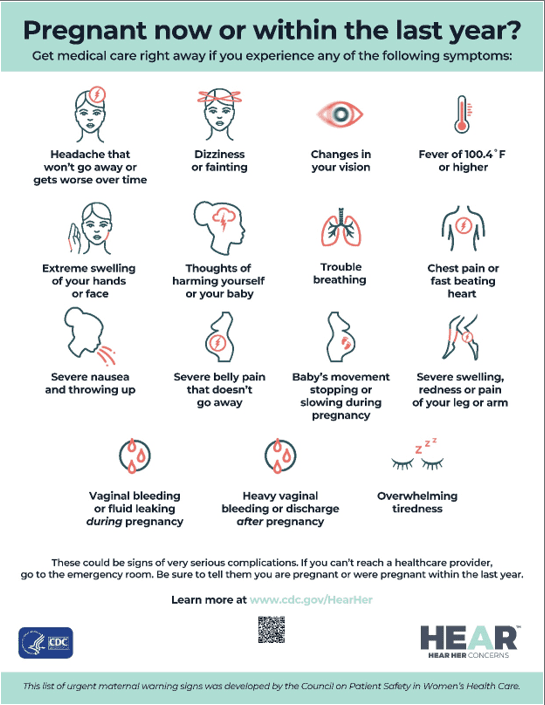
Warning Signs of Pregnancy: A Comprehensive Guide
Pregnancy is a transformative journey that brings immense joy and anticipation. However, it is crucial to be aware of the potential warning signs that may indicate complications or underlying health concerns. By recognizing these signs early on, you can seek timely medical attention and ensure the well-being of both yourself and your baby.
Early Pregnancy Warning Signs
-
Missed Period: The most common early sign of pregnancy is a missed menstrual period. If you are sexually active and have not had a period for more than a week past your expected date, it is advisable to take a pregnancy test.
-
Breast Tenderness and Enlargement: As your body prepares for lactation, your breasts may become tender, swollen, and heavier. This is typically accompanied by a darkening of the areolas (the area around the nipples).
-
Nausea and Vomiting (Morning Sickness): Nausea and vomiting, commonly known as morning sickness, is a common symptom in the early stages of pregnancy. It can occur at any time of the day or night and is often accompanied by a loss of appetite.
-
Fatigue: Pregnancy can cause significant fatigue, as your body works hard to support the growing baby. You may feel exhausted even after getting a full night’s sleep.
-
Frequent Urination: As your uterus expands, it puts pressure on your bladder, leading to increased urination. This is especially noticeable during the first trimester.
-
Mood Swings: Hormonal changes during pregnancy can trigger mood swings, irritability, and emotional sensitivity. These fluctuations are usually mild and temporary.
Warning Signs of Complications
While most pregnancies progress smoothly, it is important to be aware of certain warning signs that may indicate complications. If you experience any of these symptoms, seek medical attention immediately.
-
Vaginal Bleeding: Any vaginal bleeding during pregnancy is a cause for concern. It could be a sign of miscarriage, placental abruption, or other serious complications.
-
Severe Abdominal Pain: Intense or persistent abdominal pain, especially if accompanied by fever or chills, may indicate an ectopic pregnancy (when the fertilized egg implants outside the uterus) or other medical emergencies.
-
Headaches: Severe or persistent headaches that do not respond to over-the-counter pain relievers may be a sign of preeclampsia, a serious condition characterized by high blood pressure and protein in the urine.
-
Vision Changes: Sudden changes in vision, such as blurred vision, floaters, or flashing lights, may indicate preeclampsia or other eye-related complications.
-
Swelling: Excessive swelling in the hands, feet, face, or legs can be a sign of preeclampsia or other underlying health issues.
-
High Blood Pressure: Blood pressure that is consistently above 140/90 mmHg during pregnancy may indicate preeclampsia or other cardiovascular complications.
-
Protein in Urine: The presence of protein in your urine during pregnancy can be a sign of preeclampsia or kidney problems.
-
Preterm Labor: Regular contractions or vaginal bleeding before 37 weeks of pregnancy may indicate preterm labor. This requires immediate medical attention to prevent premature birth.
Other Warning Signs
In addition to the major warning signs listed above, there are other symptoms that may warrant medical evaluation during pregnancy. These include:
-
Fever: A fever of 101°F (38.3°C) or higher may indicate an infection that requires treatment.
-
Chills: Chills or shaking can be a sign of infection or other medical conditions.
-
Constipation: Severe or persistent constipation can be uncomfortable and may indicate underlying health issues.
-
Diarrhea: Persistent diarrhea can lead to dehydration and electrolyte imbalance, especially during pregnancy.
-
Skin Rashes: New or worsening skin rashes may be a sign of an allergic reaction or other medical conditions.
When to Seek Medical Attention
If you experience any of the warning signs listed above, it is crucial to seek medical attention immediately. Early diagnosis and treatment can significantly improve outcomes for both you and your baby.
Prevention and Management
While some warning signs of pregnancy are unavoidable, there are steps you can take to reduce the risk of complications and promote a healthy pregnancy:
-
Prenatal Care: Regular prenatal checkups are essential for monitoring your health and the baby’s development. Your doctor will screen for potential complications and provide guidance on nutrition, exercise, and other important aspects of pregnancy.
-
Healthy Lifestyle: Maintaining a healthy lifestyle during pregnancy, including a balanced diet, regular exercise, and adequate rest, can help reduce the risk of certain complications.
-
Avoid Smoking and Alcohol: Smoking and alcohol consumption during pregnancy can have severe consequences for both the mother and the baby.
-
Manage Underlying Health Conditions: If you have any underlying health conditions, such as diabetes or high blood pressure, it is crucial to manage them closely during pregnancy.
Conclusion
Pregnancy is a time of joy and anticipation, but it is also essential to be aware of the potential warning signs that may indicate complications. By recognizing these signs early on and seeking medical attention promptly, you can ensure the well-being of both yourself and your baby. Regular prenatal care, a healthy lifestyle, and open communication with your healthcare provider are key to a safe and fulfilling pregnancy journey.